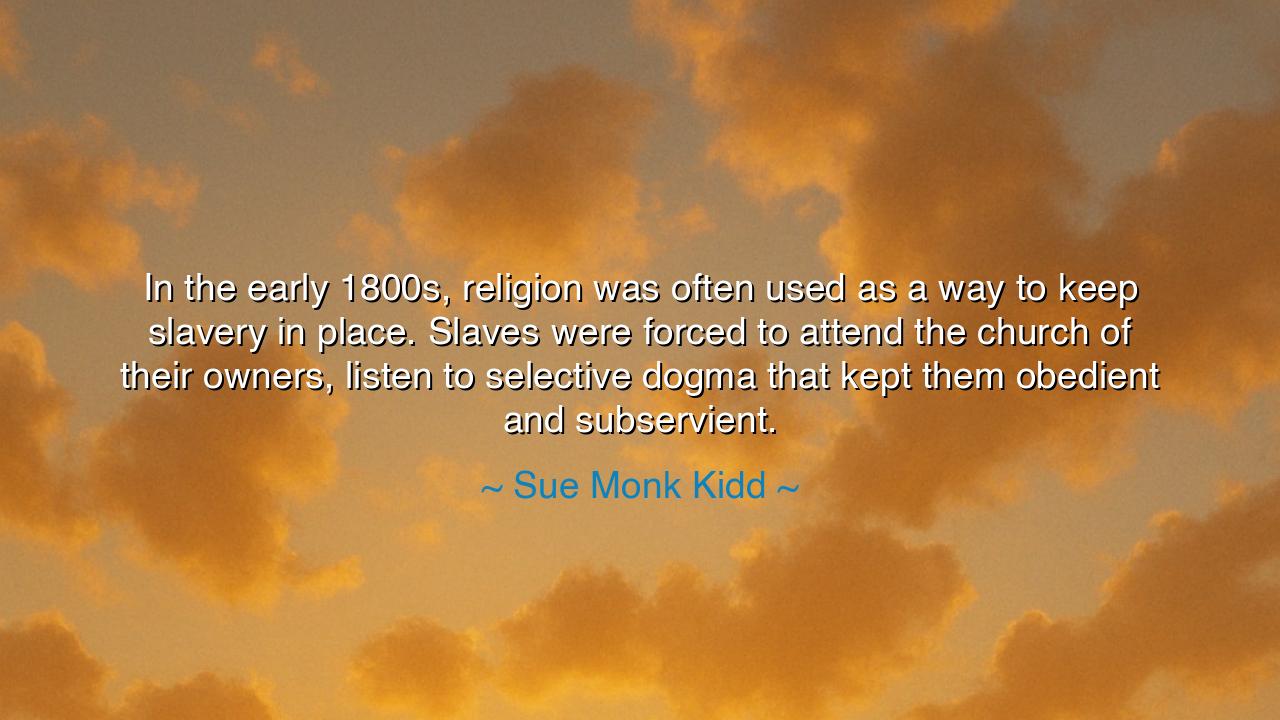
In the early 1800s, religion was often used as a way to keep
In the early 1800s, religion was often used as a way to keep slavery in place. Slaves were forced to attend the church of their owners, listen to selective dogma that kept them obedient and subservient.






Sue Monk Kidd, with a voice that pierces the silence of history, declared: “In the early 1800s, religion was often used as a way to keep slavery in place. Slaves were forced to attend the church of their owners, listen to selective dogma that kept them obedient and subservient.” These words are not merely observation but lamentation, for they reveal the shadow of how sacred truth was twisted into a tool of chains. The eternal flame of faith, meant to set men free, was bound and shackled, bent to serve the cruel will of masters. Here we learn the dark lesson: even the holiest of things can be corrupted when wielded without justice and love.
The ancients themselves warned of this danger. Prophets cried out against priests who spoke lies in the name of heaven. The Hebrew seer thundered: “Woe to those who call evil good and good evil!” In the days of Rome, emperors declared themselves divine to justify tyranny. So too, in the early 1800s, slaveholders cloaked oppression in the language of piety, preaching a selective dogma that silenced revolt and sanctified cruelty. They taught the enslaved to bow not only their bodies but also their spirits, stripping them of hope. Thus, the temple became a prison, and the pulpit became a chain.
And yet, O listener, within this darkness a greater light was born. Though forced to sit in the churches of their oppressors, the enslaved carried in their hearts a hidden gospel—the true gospel of liberation. In the hush of the night, in the hush-arbors of the woods, they sang spirituals that cried out to heaven: “Go down, Moses, way down in Egypt’s land, tell old Pharaoh: Let my people go!” They took the stories of Israel’s exodus and claimed them as their own. Though men tried to use religion to bind them, the enslaved transformed it into a weapon of hope, a secret fire that no master could quench.
Consider the story of Nat Turner, a slave preacher who in 1831 led a rebellion in Virginia. He saw in the scriptures not submission but judgment upon the wicked. Though his uprising was crushed, his life revealed a truth the oppressors feared: that the same Bible they used to enslave also carried within it the seeds of freedom. This is the irony of Kidd’s words—those who misused religion sought to forge chains, but in their very teaching, they handed the enslaved a sword.
But hear also the caution for all generations: whenever power seeks to bend faith to its will, injustice follows. When sacred words are used to justify inequality, violence, or hatred, they cease to be sacred and become tools of oppression. This happened in the past, and it may happen again if we do not keep watch. Religion in its true form is meant to lift the lowly, to break chains, to set captives free. Any doctrine that teaches otherwise is not holy fire, but smoke that blinds.
The lesson is clear: question every voice that preaches submission to cruelty. Do not accept selective dogma that strips others of dignity. Seek always the heart of truth, which is justice, compassion, and freedom. If you are a person of faith, let your faith never be the lash but the balm; never the chain but the key. Let it call you to defend the oppressed, not to excuse the oppressor.
Practical wisdom flows from this: study the past so that you may not repeat it. When you hear words of power spoken in the name of God, weigh them against love and justice. If they enslave, reject them; if they liberate, embrace them. Stand beside the marginalized, raise your voice for those silenced, and never allow the holy to be used as a cloak for cruelty. For history has shown us the cost when good men remain silent and when sacred truth is twisted to serve dark ends.
So let it be remembered: though religion was once misused to enforce obedience and subservience, the true flame of faith belongs to freedom, to dignity, to hope. Carry that flame forward, O children of tomorrow. Keep it burning pure, so that never again will the temple be a prison, nor the word of God a chain. Instead, let it be what it was always meant to be: a song of deliverance, a river of justice, a light for all mankind.






AAdministratorAdministrator
Welcome, honored guests. Please leave a comment, we will respond soon